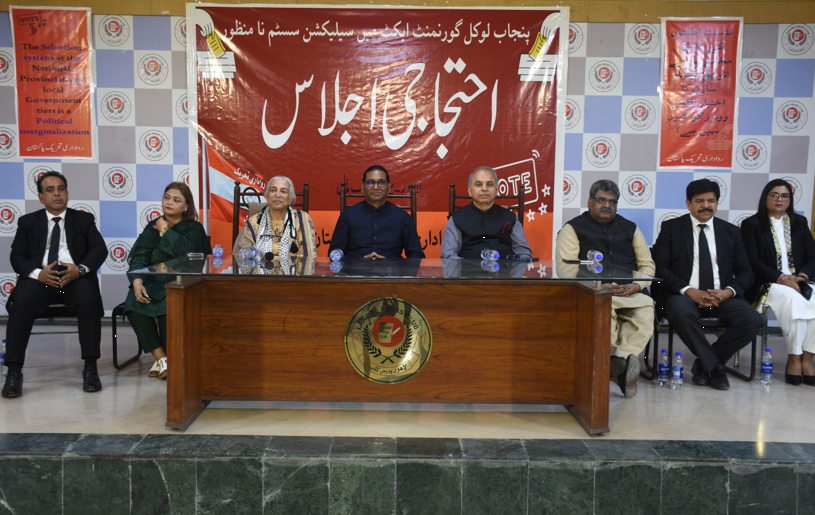News Desk
Lahore, November 7, 2025:
Rwadari Tehreek Pakistan, in collaboration with Christians’ True Spirit and Human Friends Organization, organized a public assembly at the Lahore Press Club on Thursday to express concern over the recently promulgated Punjab Local Government Act 2025, questioning its implications for democratic representation and minority participation.
The event drew participation from political, social, and human rights activists, as well as representatives of religious minorities. Among those present were Samson Salamat (Chairman, Rwadari Tehreek Pakistan), Ashar Sarfraz and Kathrine Sapna Karamat (Chief Executive and Director, Christians’ True Spirit), Saeeda Diep (Chairperson, CPSS), Sajid Christopher (President, Human Friends Organization), Saleem Bhatti (Deputy Information Secretary, PPP Punjab), Rev. Amjad Niamat (Chairman, Ecumenism, Human Rights & Interfaith Harmony Commission), Shoaib Nabi Gill (Political Activist, PTI), Chaudhary Tariq Siraj (Chairman, Mutehida Masihi Party), and lawyers Nadeem Hassan, Rubecca Harrison, and Riaz Anjum.
Participants voiced concern that the new Act, despite Article 140-A of the Constitution guaranteeing administrative, financial, and political authority to elected local governments, contradicts democratic principles. They argued that the introduction of non-party based elections and the transfer of significant powers to bureaucrats undermine representative governance.
Opposition parties and civil society groups have also questioned whether the new system will actually strengthen local democracy or simply centralize authority under administrative control.
Speaking at the assembly, Samson Salamat, Chairman of Rwadari Tehreek Pakistan, said that holding local government elections on a non-party basis would weaken political accountability.
“Our primary concern is that under the Punjab Local Government Act 2025, elections will be held on a non-party basis, sidelining political representation. Without party affiliation, voters will not know what policies or principles their candidates represent,” he said.
Mr. Salamat further criticized the Act for granting “significant administrative and financial powers” to bureaucrats through the creation of new entities such as the District Municipal Coordination Forum and Joint Authorities, which, he said, would limit the control of elected representatives over local affairs.
He also expressed concern over the selection system for reserved seats, describing it as
“undemocratic and unfair,” and likely to deepen the political marginalization of minorities, women, and labor groups.
“The system of proportional representation for religious minorities has already proved counterproductive, leaving them voiceless. Unfortunately, this undemocratic practice has now been extended to the local government level,” Mr. Salamat added.
Under the new law, eight elected general councilors in each Union Council will select — rather than elect — representatives for reserved seats for minorities, women, laborers/peasants, and youth. Critics argue that this process could allow ruling elites to appoint loyalists instead of genuine representatives, leading to increased political marginalization, horse-trading, and reduced transparency.
The public assembly concluded with a call for the Punjab government to review the Act and ensure that the local government system upholds democratic values, constitutional guarantees, and genuine public participation.


